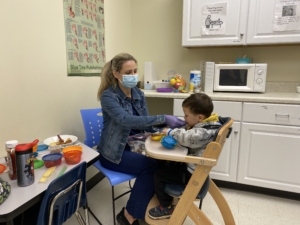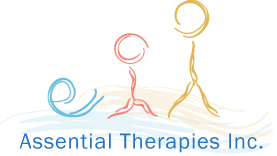 Once you schedule your Feeding evaluation, our front desk will email you a link to complete your initial paperwork. This paperwork includes your basic registration, Consent forms, HIPPA forms, and financial policy. The paperwork must be completed prior to your first visit. Additionally, please complete the Feeding history form posted on our website. Completing the Feeding history form in detail prior to the session will allow the therapist to better prepare and plan for the evaluation.
Once you schedule your Feeding evaluation, our front desk will email you a link to complete your initial paperwork. This paperwork includes your basic registration, Consent forms, HIPPA forms, and financial policy. The paperwork must be completed prior to your first visit. Additionally, please complete the Feeding history form posted on our website. Completing the Feeding history form in detail prior to the session will allow the therapist to better prepare and plan for the evaluation.
Plan on spending about an hour at our office for the feeding evaluation. During the feeding evaluation, your therapist will watch your child eat, so don’t forget to bring food and a drink with you to your appointment. Due to high incidence of food allergies, our office does not provide food for therapy. Please bring 3 foods that your child is likely to eat and 3 foods that your child struggles with. During the evaluation the therapist evaluates:
- Oral Strength and Movement: Therapist will look at your child’s mouth to ensure that he has enough strength and movement of all the parts of the mouth.
- Oral Skills for Eating: Our mouth moves differently while we eat different food textures. We like to look at food textures such as purees like applesauce, soft lumpy foods like oatmeal, mushy foods like bananas, crunchy foods like crackers, chewy foods like meats, and hard foods such as raw baby carrots, apples, celery etc. Please refer to the enclosed food list to determine what foods based on your child’s age are appropriate for you to bring for the evaluation.
- Breathing during Eating: Your mouth is a common passage for air and food. Breathing is more critical for the body than eating. Each time we swallow a bite of food, we have to hold our breath. You cannot breathe and swallow at the same time. So it is critical for our body to balance the breathing and swallowing function while we eat. This observation is particularly important when we evaluate young children and babies.
- Posture and Motor skills: In order to be able to eat, we have to be able to hold our body upright. Your feeding therapist will observe your child’s sitting balance. If you are have an infant, then we will look at the head control and sitting balance during feeding.
- Self Feeding Skills: We look at your baby’s ability to bring her hands to mouth, finger feed, hold the bottle/cup, and feed herself using utensils.
Please make sure to bring all the different utensils, bottles, cups, straws that you have been trying at home. Also, if you have received feeding/speech therapy in the past please bring all of your therapy tools such as NUK brushes, chewy tubes, Z vibe that you might have used in the past.
At the end of the evaluation, your therapist will review her clinical findings with you along with a therapy plan. A recommendation for therapy services 1x/week or 2x/week will be made. At this time, your therapist will direct you to the front desk to schedule ongoing therapy sessions. Hopefully, this information will prepare you for your first visit. We look forward to helping you and your child.
Please use the following Table to determine what foods to bring with you,
Child’s Age | Foods to Bring |
0-5months |
|
6 months – 1yr. |
Please bring at least one soft table food even if this is a problem texture for your baby. |
1-2 years |
1. Fruit (e.g. a fresh banana, or Graduates such as a jar of diced peaches or pears or apples or any other soft fresh fruit) 2. A soft cooked vegetable (e.g. cooked carrots, green beans, peas, ripe avocado etc.) 3. A slice of bread 4. 1-2 crackers (e.g. Ritz crackers, graham crackers, teddy grahams etc.) 5. Dry cereal (e.g. Cheerios, Fruit loops, Kix or other cereal that your child tolerates eating). 6. Meats that you have tried at home (e.g. chicken nuggets, hot dog, meat ball, lunch meat etc.) Please bring vegetarian (soy based meats if you are vegetarian). If you do not eat any form of meat, then please skip this item. |
2 years -4 years |
|
School Age Children |
|
Tube Fed Children |
|
